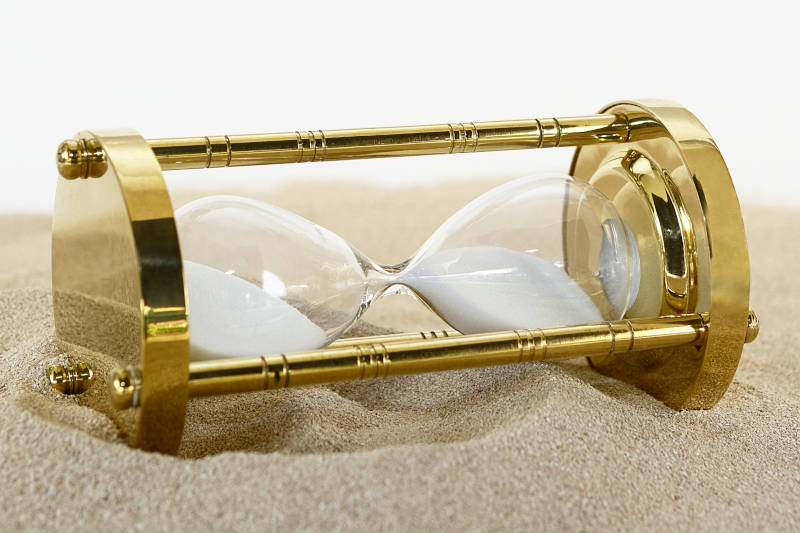I was daydreaming earlier today and I got to thinking about just how long lucid dreams last.
The interesting thing about how long lucid dreams last is that it is a function of both clock time and perceived time. We can have dreams that seem to last for days or longer in a single night. How long an individual dream lasts depends on a combination of factors including how much stuff is happening to us inside those dreams. In this article, we’ll go over what that means and how to have lucid dreams that you perceive as lasting for as long as you might wish.
A common misconception that people have is that time is fixed. This idea comes about because we measure time with devices, such as clocks, watches and phones, that appear to break time down into simple, discrete, measurable units.
When we measure time like this, it creates the illusion that time is fixed.
The difference between clock time and perceived time
In order to understand what’s going on, we must first make a distinction between clock time and perceived time.
Clock time is the amount of time that passes as measured by our clocks. The official definition of clock time is in seconds and it’s based on measurable properties of a Caesium-133 atom.
Perceived time is the amount of time that we perceive as passing.
Anyone who has waited for a pot to boil can tell you that these two concepts are not necessarily related to each other. This phenomenon is so universal that we even have expressions dedicated to it. A watched pot never boils. Time flies when you’re having fun.
When we’re having fun, or in a state of flow, time does seem to fly past and before we know it, we’re back to whatever wasn’t fun.
And when we’re bored, or unpleasant things are happening to us, time seems to slow right down.
It can almost seem like our minds are trying to force us to have as poor an experience of life as possible.
In reality, this is part of the survival mechanism in our brains encouraging us to do more of things that are good for us. And less of the bad.
How much time can we perceive
Since the rate at which time passes and how much time we perceive appear to be only loosely related to each other, it makes sense to ask how much time we can perceive.
To put it more clearly, if a minute of clock time passes, how much time is it possible for us to perceive in that minute of clock time?
All I can say about this is that as yet, no-one really knows.
But we can make some educated guesses. We have anecdotal evidence about the upper limits. And the lower ones.
In the context of lucid dreams, usually we want to have more time rather than less. So I won’t go into the lower limits here other than to say that many people have reported entire days passing in the blink of an eye when they’ve been fully absorbed in whatever they’re doing.
Which brings us to the upper limits.
Time distortion in hypnosis
Back in the 1950s, Linn Cooper and Milton Erickson published a book on time distortion in hypnosis. In this book, they detail a series of experiments that they ran.
In running their experiments, Cooper and Erickson discovered that subjects could easily experience a few hours of perceived time in the space of a few minutes of clock time. They tested this using a variety of techniques, including having their subjects practice new skills and measuring their progress.
Because the amount of improvement in some skills is relatively easy to measure, this was considered to be compelling evidence.
Less scientific experiments have resulted in subjects reporting experiences of anywhere up to 1000 years in the space of a few minutes of clock time.
It’s probably important at this time to point out that results may vary.
In my experiments on myself, I’ve never managed to perceive more than about an hour in 10 minutes of clock time.
Read more: How to Bend Time With Hypnosis
In experiments I’ve run on others, I’ve managed to have them experience up to 50 years in the space of a few hours of clock time.
So what is the upper limit? My best guess is that we can easily perceive anything up to a few days within an hour of clock time. And we can probably perceive much more.
What does a typical sleep cycle look like
Next, it’s important to have an idea of what sleep looks like.
When we sleep, our brain works through a series of sleep cycles. And we feel refreshed when we wake up at the end of a sleep cycle.
This is why the Wake Back to Bed method of inducing lucid dreams is a bad idea. For most people, it’s not possible to judge how long it will take us to fall asleep. If we could do this, we wouldn’t need alarm clocks.
Read more: How to Fall Asleep Even if You Can’t Stop Thinking
These sleep cycles typically last between 90 and 120 minutes each.
And in each sleep cycle, our brain activity goes up and down between light and deep sleep.
The last stage of each sleep cycle is known as REM sleep, and it is in REM sleep that we dream.
As the night progresses, the REM stage becomes longer in each successive sleep cycle. This means that we have more clock time for dreams that happen in the later sleep cycles.
How long does the dream stage last
So how long does a typical dream cycle last? As the night progresses, the workload inside our brains shifts from the other stages of sleep to the REM stage.
When we sleep, each REM stage is longer than the last. In our first cycle of sleep it might be only 10 minutes. By the time we get to our final REM sleep of the night, it might last for an hour.
How long do lucid dreams last
Now that we know how our perception of time works, and we know how much clock time we have available inside a dream, we’re in a position to work out how long lucid dreams can last.
Let’s do some math, because everyone loves math!
First, we know that our shortest dreams require about 10 minutes of clock time.
And we know that we can easily perceive several days in an hour of clock time.
Which means that our lucid dreams can easily last for half a day. And probably much longer.
As we move through our sleep cycles, the REM stage becomes longer. In the final REM stage, we may have a full hour of clock time available. This full hour can lead to a lucid dream lasting several days of perceived time.
And of course, if we get good at time distortion, we may be able to make our lucid dreams last much longer.
Possibly even years. Or decades. Every single night.
It all comes down to how much time we need for the thing we’d like to experience. And how many details we can involve.
In my book Lucid, I go over how to plan your dreams, along with the easy way to have more time in them.




